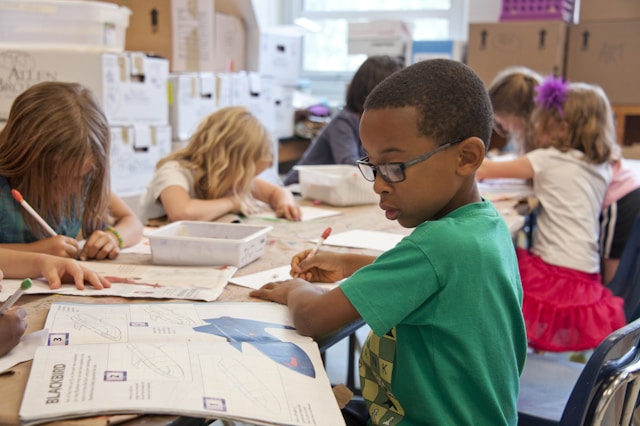Bringing a little kid to school on the first day is significant for both children and their parents. It feels thrilling since kids begin new adventures and discover lots of things, yet it might also cause some nervousness or uncertainty about future events. As parents, we possess numerous strategies and methods to help our small kids manage this transition with ease and assurance. This piece will talk about some essential suggestions for beginning the process of sending young children to school.

- Start Early and Establish a Routine
To prepare small kids for the start of school, it’s good to start early and keep a consistent schedule. You can introduce aspects of the school routine into your child’s daily life gradually, such as setting specific times for waking up, eating meals, and sleeping. It could help your child become accustomed to the daily schedule of school and understand what they should do, which might make them feel less anxious about new things.
- Talk About What to Expect
Communicating with your child is essential for preparing them for school. Dedicate time to describe how their day will look, the people they are going to encounter like educators and fellow students, and the activities they will engage in while at school. To help your child comprehend what school is like, you might use books or videos and do role-playing exercises to answer their questions or concerns.
- Visit the School and Meet the Teachers
Learning about the school environment and meeting their teachers can help your child feel less anxious and more confident. Take opportunities such as open houses, orientation sessions, and welcome events to visit the school, view the classrooms they will be in, and speak with the educators and staff members present. Inform your child that asking questions and expressing concerns is beneficial, and reassure them that they are not alone in navigating this new experience.
- Practice Independence and Self-Help Skills
Small kids need to learn doing things on their own during school time. Help your child to practice dressing up, using the bathroom alone, and handling their backpack by removing items and packing them again. It will make their confidence stronger and motivate them to handle daily tasks at school on their own.
- Establish Open Communication with Teachers
It is essential to continue communication with your child’s teachers for a beneficial beginning in school. Ensure that you meet these educators and initiate conversation early on. Please share details about your child’s personality, their interests, and requirements. Keep in regular contact with the school throughout the year should you have any concerns or inquiries.
- Label Clothing and Belongings
Many people forget to put names on their small kids’ clothes and stuff before they send them off to school. Little ones often lose their things, and in a busy place like a school, these items can be accidentally taken by someone else or get lost. To prevent any mix-ups and to make sure your child gets their things back, it’s a good idea to buy some clothing tags or use a permanent pen to put their name on clothes, bags for school, boxes for lunch, and other items they own.
Clothing labels for kids is helpful for identifying your child’s belongings. It teaches them responsibility and how to manage their possessions properly. Assist your child in attaching name tags to their belongings so they can practice taking care of them while at school. When clothes and items have names on them, you get peace of mind because it becomes simple to identify what belongs to your child, which lowers the risk of these things getting lost.
- Encourage Positive Attitudes and Mindsets
Tell your child it is good to think positively and look at things from a nice perspective when they begin school. Emphasize that trying different activities, making new friends, and approaching challenges with optimism are significant. Make sure to recognize your child’s accomplishments and significant events, no matter how small they might be, and consistently express to them the pride you experience regarding their development.
- Create a Positive Goodbye Routine
Leaving can be difficult for young children, particularly when they begin attending school. Establish a consistent routine to say goodbye that offers your child comfort and helps them adjust to the new experience of going to school. Establish a consistent goodbye ritual, such as a special handshake or hug, and reassure your child that you will return to pick them up at the end of the day.
In conclusion, when young children begin attending school, it’s a significant milestone that can bring joy and some anxiety to both parents and kids. Starting preparations early, establishing consistent routines, talking about what to expect at school, visiting the school in advance, encouraging your child’s independence skills development, regularly communicating with teachers, having positive morning farewell rituals and fostering an optimistic mindset can ease the transition into schooling for your child confidently. When small kids get love, assistance and guidance from people around them, they have the potential to succeed in school and begin a journey of discovering new knowledge, maturing and understanding more about the world.
















Add Your Comment